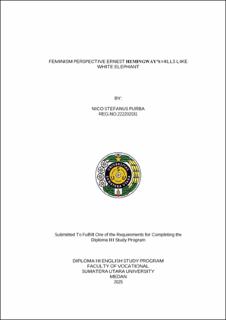| dc.description.abstract | Background of Study : Ernest Hemingway‟s short story Hills Like White Elephants
is known for its minimalist dialogue and underlying emotional tension. The story
subtly presents the imbalance of gender dynamics within a personal relationship,
where the male character seemingly dominates the conversation and decision making process. Feminist literary criticism offers a useful lens for uncovering these
power imbalances and understanding how female characters are positioned within
the narrative.
Objective : The objective of this study is to describe how feminist themes are
reflected in Hills Like White Elephants, particularly focusing on the inequality of
power between male and female characters and how this affects the female
character‟s autonomy in making personal decisions.
Method :This research uses a qualitative descriptive method. The primary data
source is the short story itself, which is analyzed using feminist literary theory,
especially from the viewpoints of liberal feminism and existential feminism (e.g.,
Simone de Beauvoir), to interpret the characters' interaction and the implicit
meaning behind their dialogue.
Result : The analysis reveals that the female character, Jig, is portrayed as being
under emotional pressure and subtle manipulation by the male character. She
shows signs of inner conflict and limited freedom in expressing her true desires,
especially regarding a significant decision implied in the story (abortion). The
power imbalance becomes evident through their interaction and the subtext of the
conversation.
Conclusion : The study concludes that Hills Like White Elephants exposes a
gendered imbalance of power in intimate relationships. Despite Hemingway‟s
restrained writing style, the story embeds clear feminist concerns regarding
women‟s agency, emotional suppression, and the societal expectations placed upon
them in male-dominated contexts.
Keywords : feminism, Hemingway Hills Like White Elephants, radical feminism. | en_US |


